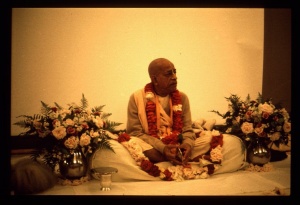CC Antya 18.31 (1975): Difference between revisions
(Vanibot #0027: CCMirror - Mirror CC's 1996 edition to form a basis for 1975) |
(Vanibot #0020: VersionCompareLinker - added a link to the Version Compare feature) |
||
| Line 2: | Line 2: | ||
<div style="float:left">'''[[Sri Caitanya-caritamrta (1975)|Śrī Caitanya-caritāmṛta (1975)]] - [[CC Antya (1975)|Antya-līlā]] - [[CC Antya 18 (1975)|Chapter 18: Rescuing the Lord from the Sea]]'''</div> | <div style="float:left">'''[[Sri Caitanya-caritamrta (1975)|Śrī Caitanya-caritāmṛta (1975)]] - [[CC Antya (1975)|Antya-līlā]] - [[CC Antya 18 (1975)|Chapter 18: Rescuing the Lord from the Sea]]'''</div> | ||
<div style="float:right">[[File:Go-previous.png|link=CC Antya 18.30 (1975)|Antya-līlā 18.30]] '''[[CC Antya 18.30 (1975)|Antya-līlā 18.30]] - [[CC Antya 18.32 (1975)|Antya-līlā 18.32]]''' [[File:Go-next.png|link=CC Antya 18.32 (1975)|Antya-līlā 18.32]]</div> | <div style="float:right">[[File:Go-previous.png|link=CC Antya 18.30 (1975)|Antya-līlā 18.30]] '''[[CC Antya 18.30 (1975)|Antya-līlā 18.30]] - [[CC Antya 18.32 (1975)|Antya-līlā 18.32]]''' [[File:Go-next.png|link=CC Antya 18.32 (1975)|Antya-līlā 18.32]]</div> | ||
{{CompareVersions|CC|Antya 18.31|CC 1975|CC 1996}} | |||
{{RandomImage}} | {{RandomImage}} | ||
==== TEXT 31 ==== | ==== TEXT 31 ==== | ||
Latest revision as of 23:31, 26 January 2020

His Divine Grace
A.C. Bhaktivedanta Swami Prabhupada
A.C. Bhaktivedanta Swami Prabhupada
TEXT 31
- koṇārkera dike prabhure taraṅge lañā yāya
- kabhu ḍubāñā rākhe, kabhu bhāsāñā lañā yāya
SYNONYMS
koṇārkera dike—toward the Koṇārka temple; prabhure—Śrī Caitanya Mahāprabhu; taraṅge—the waves; lañā yāya—take away; kabhu—sometimes; ḍubāñā—causing to sink; rākhe—keep; kabhu—sometimes; bhāsāñā—floating; lañā yāya—take away.
TRANSLATION
Keeping the Lord sometimes submerged and sometimes afloat, the waves carried Him toward the Koṇārka temple.
PURPORT
Koṇārka, generally known as Arka-tīrtha, is a temple of Lord Sūrya, the sun-god. It is situated on the seashore, nineteen miles north of Jagannātha Purī. It was constructed of black stone in the beginning of the thirteenth century of the Śaka Era, and it shows expert craftsmanship and architecture.